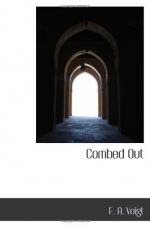“Put yer stick under ‘im an’ ’eave ’im out!”
One of the men pushed his stick obliquely into the ground and levered up the putrefying corpse. The other turned the pockets inside out. A few soiled and mouldy bits of paper came to light, but nothing of any value.
“Just our bastard bleed’n’ luck! Let’s see if we can’t find a Fritz or a Tommy!”
Robbing the dead was always a recognized thing at the front, but our Corporal, who was rather an unsoldierly individual, did not seem to think it quite the proper thing, and shouted:
“What d’you want to rob the dead for? Why don’t you leave them alone?”
“What’s it got ter do wi’ you?” answered one of the treasure-seekers. “Why don’t yer mind yer own bleed’n’ business? What’s the use o’ lettin’ good stuff go west? A dead un can’t do nothin’ wi’ watches an’ rings an’ five-franc notes! Gorblimy, ‘ave a bit o’ sense! It’s allus your class o’ blokes what makes a bleed’n’ fuss!”
Having thus vindicated their rights, the two men turned away in order to continue their search for the legitimate spoils of war.
We walked on and the gulley widened out into a level crater-field. The hill loomed dimly behind us, and, looking ahead through the rain and mist, we could see the reddish blur of a ruined village.
Near a small shell-hole were the remains of a German who had been blown to bits. The clothes, limbs and trunk were in one confused heap. The head lay some distance off; it was quite undamaged. The skin was black and drawn tightly over the skull. The hair was matted, but the short, blonde moustache had been neatly trimmed. The lips were shrivelled, exposing two perfect rows of white teeth, giving the dead face a horrible expression of ferocity. The eyelids were closed and taut, the cracks near the nose revealed the dark, empty eye-cavities underneath.
A little further on lay another head. The face had been smashed and no features were recognizable except the lobe of one ear, behind which there was a deep triangular hole. Two or three yards away there was a booted leg and beyond that a severed hand lying beside a heap of rotting flesh, bone and sodden clothing, all covered with thick brown masses made up of the innumerable empty cases of maggot chrysalids.
We struck a main road. It was dotted with shell-holes that had recently been filled in with bricks and pieces of stone. To the left of the road were many scarred tree-trunks. Some were still erect, others were aslant, while others lay prone, having been broken off short or torn up by the roots. They were all dead and ashen grey. Behind them was a broad ring of stagnant water covered with duckweed. On the island within the ring was a huge heap of loose bricks—a few months ago this had been a picturesque chateau with gabled roofs, surrounded by gardens and a wooded park. Amongst the shell-holes and scattered branches and twisted lengths of white railing, a few michaelmas daisies, chrysanthemums, dahlias, and other garden flowers were in bloom.




